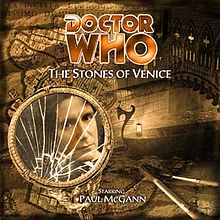
Released March 2001
‘The Stones of Venice’ is the first Big Finish script penned by Paul Magrs, and his typical imbuement of more magical and fantastical elements into the world of Doctor Who transitions easily to the audio medium.
Set in a futuristic Venice that is facing destruction by sinking, the plot takes a very genuine possibility but tinkers with the underlying reason by having it be due to a curse set upon the city and its ruler Orsino by his lost lover Estrella. This is eventually explained to be the result of alien technology, but for the purposes of the story it is treated as a magical cause, magic carrying great weight throughout the tale. So, too, however, does a sense of surrealism. The fact that the people of Venice are knowingly staying in a doomed city and meeting their end just to have one final party, that the gondoliers have somehow evolved into amphibious creatures, and that there is a strange fog that can somehow rearrange the layout of the city at random all remind of just how strange and yet still relatable the worlds of Magrs can get.
Magrs is also quite adept at instilling humour into his scripts, and Paul McGann proves adept at navigating his way through the many varied situations in this more light-hearted and relaxed affair with the straightest of deliveries so necessary for selling all of it. Charley isn’t as involved in ‘The Stones of Venice’ as in the previous stories, but she’s still given some great lines and continues to speak her mind no matter the circumstances. Even some of the clichés that come with being a companion of the Doctor’s are called into question, as is the current interior design of the TARDIS as if Charley has become a mouthpiece for a subset of Doctor Who fans at this point.
While the previous release sacrificed a development of its supporting characters in order to exude atmosphere and tension, ‘The Stones of Venice’ takes an altogether different approach and squarely places the majority of its focus on several denizens of the doomed Venice. Quite fascinatingly, each of the characters is relatively unpleasant as a person due to their arrogance and self-centred nature, but at the same time that makes them all the more enjoyable to listen to given the serious threat of the sinking city and the curse. Orsino cares about absolutely nobody but himself, Churchwell cares about nothing but preserving the city’s art, Vincenzo and the cultists are clearly insane, and Miss Lavish has convicted the entire city to death. The interplay between all of these egocentric personalities truly is captivating to watch unfold as the end draws nearer.
Yet no script can survive off of sparring arrogance entirely, and the ultimate story behind Orcino and Estrella turns into a heartbreaking tragedy. While Orcino has spent a century floundering in self-pity and misery due to his mistake, the spurned Estrella has used her bitter hatred to wreak havoc in hopes of gaining revenge. It’s quite an intriguing divergence in paths and makes the reconciliation and Orcino’s ultimate sacrifice to save his city all that more impactful. It is a testament both to Magrs’s script and also to the superb acting of Michael Sheard and Elaine Ives-Cameron that that turn of events is so powerful and believable in such a short time period given everything that has preceded it.
There are some flaws, however, although the extent of their relevance will purely be up to the listener. Presenting the entire play as a mystery regarding the reveal of Estrella is perhaps a mistake, especially since there is only one prominent female member of the cast other than India Fisher, and that does unfortunately take away from the intended effect of the revelatory moment. Likewise, the Venice presented in the story sounds like the classic and almost medieval Venice rather than one set in the future; while this does not interfere with the progression of the play at all, it is still a slightly discordant tone and ambience. Finally, this is a script very dependent on dialogue, and though the dialogue itself is quite witty and suitably strange as it moves the plot along at its own pace, there are very lengthy times where no true action occurs.
‘Stones of Venice,’ then is a bit of a mixed bag, full of fantastic ideas but many of which are never quite fully realised. However, this is perhaps the definitive voice for the Eighth Doctor so far as he continues to evolve on his continuing audio adventures; even if this isn’t the perfect tale, it still provides another strong platform for McGann who is clearly fully invested in getting his Time Lord some much needed recognition and identity.
- Release Date: 3/2001


Leave a Reply